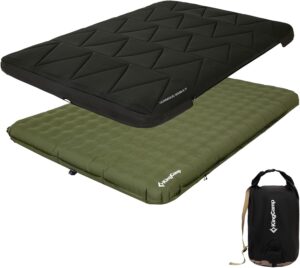Are Rooftop Tents Waterproof?
Are rooftop tents waterproof? You may be wondering about the water-resistance of rooftop tents, especially if you plan on camping in various weather conditions. Let’s dive into the details and find out if rooftop tents provide the waterproof protection you need for a comfortable camping experience.
Understanding Waterproofing in Rooftop Tents
When it comes to camping in a rooftop tent, one of the most important factors to consider is whether the tent is waterproof. A waterproof rooftop tent is essential for staying dry and comfortable during rainy weather or in areas with high humidity.
How Waterproofing Works in Rooftop Tents
Rooftop tents are designed with materials that are specifically chosen for their water-resistance properties. The outer layer of the tent is typically made from waterproof materials such as polyester or canvas that are treated with a waterproof coating. This coating helps to repel water and prevent it from seeping into the tent.
Importance of Seam Sealing
One of the key factors in determining the waterproofing of a rooftop tent is the quality of seam sealing. The seams of a tent are the most vulnerable areas where water can seep through. High-quality rooftop tents are equipped with sealed seams that are designed to prevent water infiltration.
Factors Affecting Waterproofing in Rooftop Tents
Several factors can affect the waterproofing of rooftop tents. It is essential to consider these factors when choosing a rooftop tent to ensure that you stay dry and comfortable during your camping adventures.
Material Quality
The quality of the materials used in the construction of a rooftop tent plays a significant role in its waterproofing capabilities. High-quality materials such as ripstop polyester or canvas are more durable and resistant to water penetration compared to lower-quality materials.
Waterproof Coating
The waterproof coating applied to the outer layer of a rooftop tent is crucial for its water-resistance. This coating provides an additional layer of protection against moisture and helps to repel water, keeping you dry inside the tent.
Design Features
The design of a rooftop tent also plays a crucial role in its waterproofing capabilities. Tents with features such as a rainfly, bathtub floor, and elevated platform are more likely to provide better protection against water infiltration. These design features help to keep water out and ensure that you stay dry and comfortable.
Tips for Maintaining Waterproofing in Rooftop Tents
Proper maintenance is essential to ensure that your rooftop tent remains waterproof and provides the protection you need during camping trips. Here are some tips to help you maintain the waterproofing of your rooftop tent:
Regular Cleaning
Regularly cleaning your rooftop tent is essential for maintaining its waterproofing capabilities. Dirt, dust, and debris can compromise the waterproof coating of the tent and make it more susceptible to water infiltration. Use a mild detergent and water to clean the tent, and avoid using harsh chemicals that can damage the waterproof coating.
Reapply Waterproofing Treatment
Over time, the waterproof coating on your rooftop tent may wear off due to exposure to the elements. It is recommended to reapply a waterproofing treatment to the outer layer of the tent to restore its water-resistance. Follow the manufacturer’s instructions on how to apply the treatment properly.
Store Your Tent Properly
Proper storage of your rooftop tent can help prevent damage to the waterproof coating and prolong its lifespan. Ensure that the tent is completely dry before storing it to prevent mold and mildew growth. Store the tent in a cool, dry place away from direct sunlight to avoid any damage to the materials.
Are All Rooftop Tents Waterproof?
Not all rooftop tents are created equal when it comes to waterproofing. Some rooftop tents are designed with superior waterproofing features, while others may not offer the same level of protection against moisture. It is essential to do your research and choose a rooftop tent that is known for its waterproofing capabilities.
Water Resistance Ratings
When shopping for a rooftop tent, look for information on the water resistance ratings of the tent. Manufacturers often provide ratings that indicate how well a tent can withstand water penetration. A higher water resistance rating means that the tent is more waterproof and can provide better protection against moisture.
Read Reviews
Reading reviews from other campers who have used the rooftop tent you are interested in can provide valuable insights into its waterproofing capabilities. Look for reviews that mention how well the tent held up in rainy conditions and whether users stayed dry inside the tent.
Consider Weather Conditions
Consider the weather conditions in the areas where you plan to use your rooftop tent. If you often camp in rainy or humid environments, it is essential to choose a rooftop tent that is designed to provide adequate waterproofing. Look for tents with features such as sealed seams, waterproof coatings, and water-resistant materials.
Conclusion
In conclusion, rooftop tents can be waterproof if they are designed with high-quality materials, waterproof coatings, and effective seam sealing. Proper maintenance and care are essential for maintaining the waterproofing capabilities of a rooftop tent. By understanding the factors that affect waterproofing in rooftop tents and following the tips provided in this article, you can ensure that your camping adventures are dry and comfortable, no matter the weather conditions. Choose a rooftop tent that is known for its waterproofing capabilities and enjoy camping with peace of mind knowing that you are protected from the elements.




